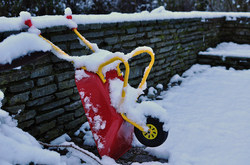 The lack of sunlight and freezing cold temps aren't just throwing you into a moody state. Your children are feeling the effects of the grey winter days too. The shorter days have messed with our Circadian Rhythms, the body's natural behavioral responses to light and dark. Researchers have found a fairly strong genetic link related to the way our 24-hour body clock responds to the shorter days, which means this: if you find yourself feeling grumpy in the winter, chances are, so do your kids. Nature's Cruel Dichotomy Here's the tricky part: while you are dealing with your winter blues by constantly fighting off the desire to stay in your PJs and cuddle up on the couch with a book and a nap, your kids are likely dealing with it by going totally bonkers with pent up energy. Isn't nature cruel? Wouldn't you give anything to borrow some of that crazy-eyed adrenaline? It turns out most children respond to disruptions in natural sleep patterns (i.e., having to wake up when it's still dark; staying awake at night after the sun has set) with a stress reaction which can includes increases in the body's natural steroid hormone cortisol. This means while you are settling in for a long winter's nap, your child is entering into "fight or flight" mode. Not a wonderful combination. What to do? Luckily, there are some easy ways to handle BOTH of these competing reactions to cabin fever. I'll break them to you slowly. 1. Get outside. YES, I know this is the LAST thing mama (or papa) bear wants to do during the chilly winter months when it's so easy to just. lay. down. But exposure to sunlight, even if it's through cloud cover, is one of the best ways to get Vitamin D, a natural stimulant and anti-depressant. A short morning walk with the kids, or sitting on the porch while the dog does his business is enough to help you have more energy all day long AND help your children regulate their levels of cortisol and feel (and act) calmer during the day. 2. Get exercise. I know I'm not the first person to tell you this: by exercising, you can increase your body's natural abilities to remain alert and focused (and therefore less depressed or groggy). Plus, exercise begets exercise. If you get out for that morning walk one day, you're more likely to get out the next day. Exercising with your CHILDREN will help them work out increased levels of cortisol and regulate internal stress levels. Play tug of war before the bus in the morning. Do 10 jumping jacks in between bites of toast. Play tag all the way to the car. Have a tickle fight. It's a win-win. 3. Get close. This one might not be that obvious. Physical touch increases levels of dopamine (think happiness-drug) and helps reinforce our sense of purpose. Instead of waking your children (or your spouse) with the light switch, try giving them a quick snuggle. Lie in bed with them while you talk about what the day will bring. This sense of closeness can help regulate emotion, soothe anxiety, and start the day with a feeling of belonging. This also works especially well when used spontaneously throughout the day. Here's the catch: to generate the big boost of regulatory hormones, the physical closeness has to be with someone with whom you've already established a bond. So, if you hug your boss or a random person in the elevator, you won't get quite the same benefit. But you might get some funny looks. 4. Get rid of the junk food. Researchers have linked spikes in sugar to a lack of concentration and mood swings in adults. This link is much stronger in children. If you are managing the winter doldrums with Dum Dums and Krispy Kremes, you will end up with a few minutes of satisfaction and many months of problems, including headaches, disrupted sleep, attention problems, behavior issues, lack of energy, increased risk for diabetes, etc. And that's just you. The effects are worse with children! Circadian Rhythm disruption can exacerbate the effects of sugar on our regulatory systems, creating a nasty cycle of sugar spikes, low blood sugar, and poor sleep quality. Try to indulge the need for comfort food with healthy alternatives like apples & cheese, carrots & Ranch dressing, or bananas & peanut butter. Your mind, your mood, and your children's teachers will thank you. Above all else, remember this: Winter is relatively short. Take a moment each day to reflect on the GOOD things that happen in the winter. Hockey, ice skating, snowman building, extra blankets, more time with your children, etc. And if all else fails, crank up the heat, put your kids in their bathing suits, make lemonade and have a fake trip to the beach at home. There is truth in the phrase, "fake it 'til you make it"...
1 Comment
1/26/2019 01:14:03 pm
I am happy to know that I am not the only person who have this connection with winter season. There are some people who hate it because the weather is too unbearable. But the truth is, we can still be productive only if we will choose too. The kids are having these what we so called "winter blues" because they became so attached with it! All the activities they do on this season will be left behind and they need to wait for one more year again for them to do what they do.
Reply
Leave a Reply. |
AuthorKristen R. Jamison, M.T., Ph.D. Archives
January 2015
Categories |
 RSS Feed
RSS Feed